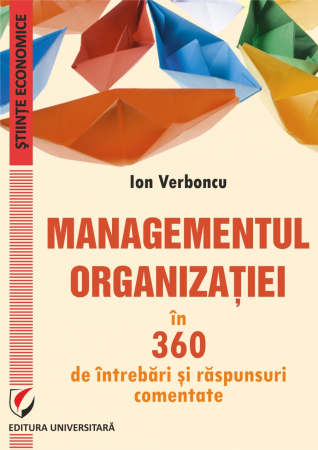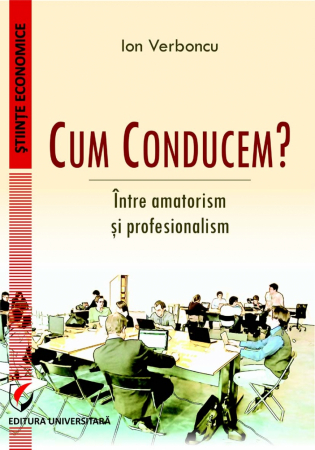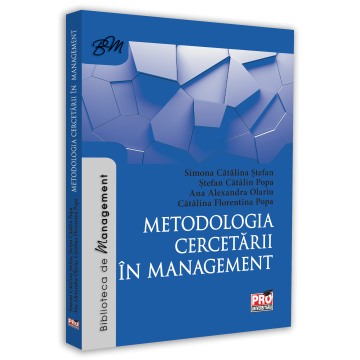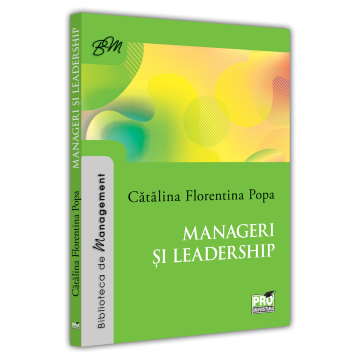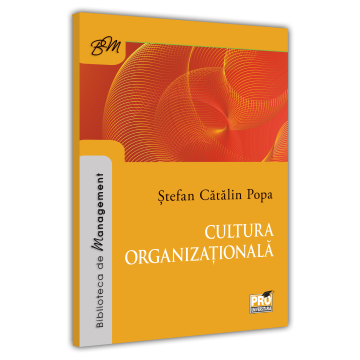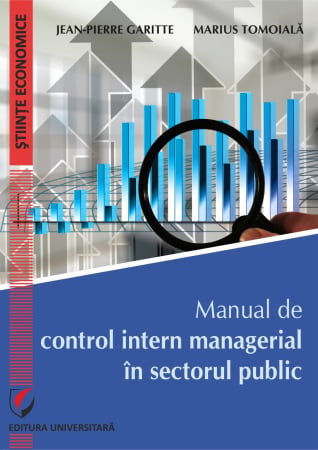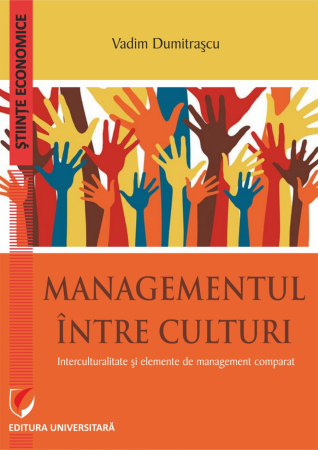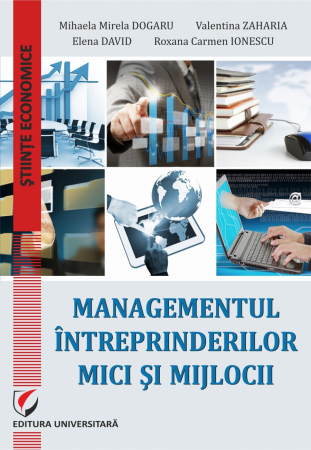Manuscript proposals: info@editurauniversitara.ro / 0745 204 115 //// Tracking orders Individuals / Sales:0745 200 718 / 0745 200 357 Orders Legal entities: 0721 722 783
ISBN: 978-606-591-757-6
DOI: 10.5682/9786065917576
Publisher year: 2013
Edition: I
Pages: 230
Publisher: Editura Universitara
Author: Gheorghita Caprarescu, Daniela Georgiana Stancu, Georgiana Aron
Product Code:
9786065917576
Do you need help?
0745 200 718
/
0745 200 357
- Description
- Download (1)
- Authors
- Content
- More details
- Where to find it
- Reviews (0)
The term management is one of the neologisms of the Romanian language that has registered a spectacular evolution, both theoretically and in practice.
Originally used in the Anglo-Saxon countries, the management concept has experienced a rapid development on all meridians of the globe.
The shaping of management as a science, consisted in the successive sedimentation of the contributions of different currents of thought, of some scientific personalities or of the practical life, around which schools and movements were established that marked the respective process. Although leadership has existed in a rudimentary form, practically, since the beginning of the organized life of the human community, the late appearance of the special interest for the field of management and its first systematic studies is explained by the fact that only to a certain degree of industrial development technologicalization of society is possible and necessary the systematization of knowledge and the formation of specific theories.
Currently, the use of the management concept has expanded from economic activity in almost all areas of human activity. There is currently talk of political management, trade union, cultural, educational, medical, etc. but also the management of land, water, natural resources, in the sense of administration, protection, consumption, etc.
Originally used in the Anglo-Saxon countries, the management concept has experienced a rapid development on all meridians of the globe.
The shaping of management as a science, consisted in the successive sedimentation of the contributions of different currents of thought, of some scientific personalities or of the practical life, around which schools and movements were established that marked the respective process. Although leadership has existed in a rudimentary form, practically, since the beginning of the organized life of the human community, the late appearance of the special interest for the field of management and its first systematic studies is explained by the fact that only to a certain degree of industrial development technologicalization of society is possible and necessary the systematization of knowledge and the formation of specific theories.
Currently, the use of the management concept has expanded from economic activity in almost all areas of human activity. There is currently talk of political management, trade union, cultural, educational, medical, etc. but also the management of land, water, natural resources, in the sense of administration, protection, consumption, etc.
-
Management
Download
GHEORGHITA CAPRARESCU
DANIELA GEORGIANA STANCU
GEORGIANA ARON
DANIELA GEORGIANA STANCU
GEORGIANA ARON
Chapter 1: THEORETICAL FUNDAMENTALS OF ORGANIZATION MANAGEMENT / 7
1.1 - General acceptances of management / 7
1.2 - Management of the organization: definition, object of study, characterization / 9
1.3 - Evolutions and orientations in the management of the organization of the XXI / 12 century
Chapter 2: MANAGEMENT PROCESS AND FUNCTIONS MANAGEMENT FUNCTIONS / 15
2.1 - The concept of the management process / 15
2.2 - Management functions / 16
2.3 - Features of the management process / 23
Chapter 3: TRAINING AND DEVELOPMENT OF MANAGEMENT SCIENCE / 26
3.1 - Precursors of management science / 26
3.2 - Management schools / 28
3.3 - The specifics of the management science approaches in the Romanian school / 38
Chapter 4: THE MANAGER / 41
4.1 - Definition, characteristics, classification / 41
4.2 - Knowledge, qualities, skills required of the manager / 44
4.3 - Management styles and their influence on the organization's performance / 45
Chapter 5: LEADERSHIP AND LEADERSHIP / 48
5.1 - Leader: definition, features, classification / 48
5.2 - The relationship between manager and leader / 50
5.3 - Leadership: concept, content, typology, influence on the organization's performance / 51
Chapter 6: ORGANIZATION AS AN OBJECT OF MANAGEMENT / 60
6.1 - Meaning and concept / 60
6.2 - Approaches and perspectives on the organization / 61
6.3 - The organization as a system / 64
Chapter 7: FUNCTIONS OF THE ORGANIZATION / 67
7.1 - The concept of function of the organization / 67
7.2 - Content of the organization's functions / 69
7.3 - Traits and interdependencies / 73
Chapter 8: ORGANIZATIONAL CULTURE / 75
8.1 - The cultural identity of the company / 75
8.2 - Components of organizational culture / 77
8.3 - Factors that influence the formation and maintenance of organizational culture / 87
8.4 - Types of organizational cultures / 90
8.5 - The influence of culture on the performance of the organization / 96
Chapter 9: MANAGEMENT DECISION / 101
9.1 - Decision essential moment of the management process / 101
9.2 - The decision-making process / 103
9.3 - Typology of decisions / 104
Chapter 10: ORGANIZATIONAL STRATEGY / 107
10.1 - Strategy, central tool of strategic management / 108
10.2 - Components of the strategy / 111
10.3 - Similarities and differences between business strategy and military strategy / 121
10.4 - Types of strategies / 123
Chapter 11: ORGANIZATIONAL STRUCTURE / 131
11.1 - Definition and components of the formal organizational structure / 131
11.2 - Characterization parameters of the formal organizational structure / 138
11.3 Types of formal organizational structures / 143
11.4 - Informal structure - definition, components, causes of occurrence / 159
11.5 - Mutual influences of the formal and informal organizational structure / 168
Chapter 12: THE INFORMATION SYSTEM / 170
12.1 - The conceptual framework of the information system / 170
12.2 - Parameters of the information system / 182
12.3 - Influences exercised and supported by the information system / 184
12.4 - Rationality requirements regarding the information system / 185
12.5 - Deficiencies of the information system and their influences on the performances of the individual and the organization / 186
Chapter 13: MANAGEMENT METHODS AND TECHNIQUES / 191
13.1 - Dashboard / 191
13.2 - Delegation / 194
13.3 - Project management (M.P.P.) / 200
13.4 - Product management (M.P.Prod) / 204
13.5 - Management by objectives (M.P.O.) / 206
13.6 - Exception Management (M.P.E.) / 210
13.7 - Value analysis / 213
13.8 - Methods and techniques for stimulating creativity / 218
BIBLIOGRAPHY / 227
1.1 - General acceptances of management / 7
1.2 - Management of the organization: definition, object of study, characterization / 9
1.3 - Evolutions and orientations in the management of the organization of the XXI / 12 century
Chapter 2: MANAGEMENT PROCESS AND FUNCTIONS MANAGEMENT FUNCTIONS / 15
2.1 - The concept of the management process / 15
2.2 - Management functions / 16
2.3 - Features of the management process / 23
Chapter 3: TRAINING AND DEVELOPMENT OF MANAGEMENT SCIENCE / 26
3.1 - Precursors of management science / 26
3.2 - Management schools / 28
3.3 - The specifics of the management science approaches in the Romanian school / 38
Chapter 4: THE MANAGER / 41
4.1 - Definition, characteristics, classification / 41
4.2 - Knowledge, qualities, skills required of the manager / 44
4.3 - Management styles and their influence on the organization's performance / 45
Chapter 5: LEADERSHIP AND LEADERSHIP / 48
5.1 - Leader: definition, features, classification / 48
5.2 - The relationship between manager and leader / 50
5.3 - Leadership: concept, content, typology, influence on the organization's performance / 51
Chapter 6: ORGANIZATION AS AN OBJECT OF MANAGEMENT / 60
6.1 - Meaning and concept / 60
6.2 - Approaches and perspectives on the organization / 61
6.3 - The organization as a system / 64
Chapter 7: FUNCTIONS OF THE ORGANIZATION / 67
7.1 - The concept of function of the organization / 67
7.2 - Content of the organization's functions / 69
7.3 - Traits and interdependencies / 73
Chapter 8: ORGANIZATIONAL CULTURE / 75
8.1 - The cultural identity of the company / 75
8.2 - Components of organizational culture / 77
8.3 - Factors that influence the formation and maintenance of organizational culture / 87
8.4 - Types of organizational cultures / 90
8.5 - The influence of culture on the performance of the organization / 96
Chapter 9: MANAGEMENT DECISION / 101
9.1 - Decision essential moment of the management process / 101
9.2 - The decision-making process / 103
9.3 - Typology of decisions / 104
Chapter 10: ORGANIZATIONAL STRATEGY / 107
10.1 - Strategy, central tool of strategic management / 108
10.2 - Components of the strategy / 111
10.3 - Similarities and differences between business strategy and military strategy / 121
10.4 - Types of strategies / 123
Chapter 11: ORGANIZATIONAL STRUCTURE / 131
11.1 - Definition and components of the formal organizational structure / 131
11.2 - Characterization parameters of the formal organizational structure / 138
11.3 Types of formal organizational structures / 143
11.4 - Informal structure - definition, components, causes of occurrence / 159
11.5 - Mutual influences of the formal and informal organizational structure / 168
Chapter 12: THE INFORMATION SYSTEM / 170
12.1 - The conceptual framework of the information system / 170
12.2 - Parameters of the information system / 182
12.3 - Influences exercised and supported by the information system / 184
12.4 - Rationality requirements regarding the information system / 185
12.5 - Deficiencies of the information system and their influences on the performances of the individual and the organization / 186
Chapter 13: MANAGEMENT METHODS AND TECHNIQUES / 191
13.1 - Dashboard / 191
13.2 - Delegation / 194
13.3 - Project management (M.P.P.) / 200
13.4 - Product management (M.P.Prod) / 204
13.5 - Management by objectives (M.P.O.) / 206
13.6 - Exception Management (M.P.E.) / 210
13.7 - Value analysis / 213
13.8 - Methods and techniques for stimulating creativity / 218
BIBLIOGRAPHY / 227
The approach to management as a science is recent and has emerged as a result of efforts by specialists and practitioners around the world in response to the needs of social practice.
The classical definition of management as an activity, given by Henry Fayol, in his book Administration industrielle et generale, published in 1916, mentions that: "to administer means to foresee, organize, command, coordinate and control". His general statement on management still remains valid in many ways, even after almost a century it has been adapted over time by more recent approaches.
Thus in 1957 E.F.L Brech defines management as a social process: "management is a social process ... and the process consists of planning, control, coordination and motivation."
Mackensie is also defined as a process in 1969: "the process in which the manager operates with three fundamental elements - ideas, things and people - achieving through others the proposed objectives"
In the 9th century, two recognized American authors in the field of management define as follows: "management is an operational process, which can be in the first phase best researched by analyzing managerial functions ... The five essential managerial functions are: planning, organization , staffing, guidance and management, as well as control. ”
The definitions proposed by the cited authors represent, in fact, more changes of emphasis than of principle. For example, the term "command" used by Fayol was abandoned to the detriment of "motivation" (Brech) or "guidance and leadership" (Koontz and O'Donnell). We must emphasize that the definitions mentioned above are very general, emphasizing in fact that "management" is a process that allows organizations to set goals and achieve them by planning, organizing and controlling their resources.
Also, we must specify that we refer to the management of the organization, as the basic scientific approach both in the works of the classics of the field and in the current approaches.
Summarizing the opinions expressed in the literature, we consider that a definition that covers the requirements of the theoretical and practical delimitation of the organization's management is the following:
"The management of the organization, as a science, studies the management process and the relationships generated by it to identify, systematize and generalize laws, principles, rules, concepts based on which new methods and techniques can be designed to ensure the efficiency and effectiveness of activities.”
As a scientific discipline, the management of the organization has its own object of study, its own language and scientific tools.
The knowledge of the object of study of the management of the organization presents a special importance for the delimitation of other disciplines as well as for the clarification of the place and the role of the discipline in the ensemble of human knowledge.
"The specific object of study of the science of management of the organization is represented by the human relations that appeared in the organization - regardless of the nature or size of the activity - by carrying out the management processes"
Exercising the management processes involves a special type of relationships between the people in the organization, respectively:
"Management relations represent the relationships that are established between the components of a system (organization) and between them and the components of other systems (organizations) in the processes of forecasting, organizing, training and evaluating the activities carried out"
Management relations have some important characteristics:
1. appear as a result of the management processes;
2. are determinants of the size and form of manifestation of some influencing factors:
• the size of the organization;
• the complexity of the products or works performed within the organization;
• the level of the technical endowment of the organization;
• the degree of specialization and cooperation of human resources within the organization;
• territorial dispersion of the subunits that make up the organization;
According to specialized studies, the analysis of the factors that condition the characteristics of management relations within organizations has a threefold determination:
socio-economic, it is explained by the dependence of property management relations. This determination ensures the same essential economic and social characteristics of organizations based on the same type of ownership.
technical-material, consists in the dependence of the management relations on the characteristics of the technical endowments of the organization (machines, equipment, etc.), on the technical-material support that is the basis of belonging to a certain branch of activity.
socio-human, reflects the way in which the human factor makes its mark on management relations. This determinant reveals the difference between the results obtained by organizations in the same field of activity you, with similar endowments, but with a different human potential.
As an independent discipline, with a specific object of study, with an evolution marked by the contribution of numerous authors from different areas of human activity, dedicated to increasing the efficiency of individual and team work, the organization's management is characterized by a series of features:
is a synthetic economic science. Through the very purpose that aims - to increase the efficiency and effectiveness of the activities carried out - the management of the organization involves the allocation and use of the organization's resources in the spirit of economic reasoning. Achieving the respective goal requires the use of knowledge belonging to different economic disciplines: micro and macroeconomic, accounting, finance, economic - financial analysis, statistics;
has a strong interdisciplinary character. Approaching the management process and the relationships it generates, both inside and outside the organization, requires the presence and use of knowledge and techniques belonging to various sciences: mathematics, computer science, psychology, sociology, etc.
has a strong applicative character. Through the tools made available to managers, diversified but congruent from the perspective of the goal pursued, the science of management serves to solve the complex problems facing the present but, especially, the perspective of efficient functioning of the organization.
is a science focused on the organizational man. Man, regardless of his position - manager or executor, individual or member of the team - remains a major topic of concern in the science of management. Viewed from the perspective of the various approaches that are found in its multidisciplinary character, it results that in the end they converge towards the indisputable conclusion: man is the basic resource of the organization and management is practiced through people, with people, for people.
The classical definition of management as an activity, given by Henry Fayol, in his book Administration industrielle et generale, published in 1916, mentions that: "to administer means to foresee, organize, command, coordinate and control". His general statement on management still remains valid in many ways, even after almost a century it has been adapted over time by more recent approaches.
Thus in 1957 E.F.L Brech defines management as a social process: "management is a social process ... and the process consists of planning, control, coordination and motivation."
Mackensie is also defined as a process in 1969: "the process in which the manager operates with three fundamental elements - ideas, things and people - achieving through others the proposed objectives"
In the 9th century, two recognized American authors in the field of management define as follows: "management is an operational process, which can be in the first phase best researched by analyzing managerial functions ... The five essential managerial functions are: planning, organization , staffing, guidance and management, as well as control. ”
The definitions proposed by the cited authors represent, in fact, more changes of emphasis than of principle. For example, the term "command" used by Fayol was abandoned to the detriment of "motivation" (Brech) or "guidance and leadership" (Koontz and O'Donnell). We must emphasize that the definitions mentioned above are very general, emphasizing in fact that "management" is a process that allows organizations to set goals and achieve them by planning, organizing and controlling their resources.
Also, we must specify that we refer to the management of the organization, as the basic scientific approach both in the works of the classics of the field and in the current approaches.
Summarizing the opinions expressed in the literature, we consider that a definition that covers the requirements of the theoretical and practical delimitation of the organization's management is the following:
"The management of the organization, as a science, studies the management process and the relationships generated by it to identify, systematize and generalize laws, principles, rules, concepts based on which new methods and techniques can be designed to ensure the efficiency and effectiveness of activities.”
As a scientific discipline, the management of the organization has its own object of study, its own language and scientific tools.
The knowledge of the object of study of the management of the organization presents a special importance for the delimitation of other disciplines as well as for the clarification of the place and the role of the discipline in the ensemble of human knowledge.
"The specific object of study of the science of management of the organization is represented by the human relations that appeared in the organization - regardless of the nature or size of the activity - by carrying out the management processes"
Exercising the management processes involves a special type of relationships between the people in the organization, respectively:
"Management relations represent the relationships that are established between the components of a system (organization) and between them and the components of other systems (organizations) in the processes of forecasting, organizing, training and evaluating the activities carried out"
Management relations have some important characteristics:
1. appear as a result of the management processes;
2. are determinants of the size and form of manifestation of some influencing factors:
• the size of the organization;
• the complexity of the products or works performed within the organization;
• the level of the technical endowment of the organization;
• the degree of specialization and cooperation of human resources within the organization;
• territorial dispersion of the subunits that make up the organization;
According to specialized studies, the analysis of the factors that condition the characteristics of management relations within organizations has a threefold determination:
socio-economic, it is explained by the dependence of property management relations. This determination ensures the same essential economic and social characteristics of organizations based on the same type of ownership.
technical-material, consists in the dependence of the management relations on the characteristics of the technical endowments of the organization (machines, equipment, etc.), on the technical-material support that is the basis of belonging to a certain branch of activity.
socio-human, reflects the way in which the human factor makes its mark on management relations. This determinant reveals the difference between the results obtained by organizations in the same field of activity you, with similar endowments, but with a different human potential.
As an independent discipline, with a specific object of study, with an evolution marked by the contribution of numerous authors from different areas of human activity, dedicated to increasing the efficiency of individual and team work, the organization's management is characterized by a series of features:
is a synthetic economic science. Through the very purpose that aims - to increase the efficiency and effectiveness of the activities carried out - the management of the organization involves the allocation and use of the organization's resources in the spirit of economic reasoning. Achieving the respective goal requires the use of knowledge belonging to different economic disciplines: micro and macroeconomic, accounting, finance, economic - financial analysis, statistics;
has a strong interdisciplinary character. Approaching the management process and the relationships it generates, both inside and outside the organization, requires the presence and use of knowledge and techniques belonging to various sciences: mathematics, computer science, psychology, sociology, etc.
has a strong applicative character. Through the tools made available to managers, diversified but congruent from the perspective of the goal pursued, the science of management serves to solve the complex problems facing the present but, especially, the perspective of efficient functioning of the organization.
is a science focused on the organizational man. Man, regardless of his position - manager or executor, individual or member of the team - remains a major topic of concern in the science of management. Viewed from the perspective of the various approaches that are found in its multidisciplinary character, it results that in the end they converge towards the indisputable conclusion: man is the basic resource of the organization and management is practiced through people, with people, for people.
www.editurauniversitara.ro
If you want to express your opinion about this product you can add a review.
write a review
Customer Support Monday - Friday, between 8.00 - 16.00
0745 200 718 0745 200 357 comenzi@editurauniversitara.ro
6359.png)
![Management [1] Management [1]](https://gomagcdn.ro/domains/editurauniversitara.ro/files/product/large/management-1210-242951.jpg)


